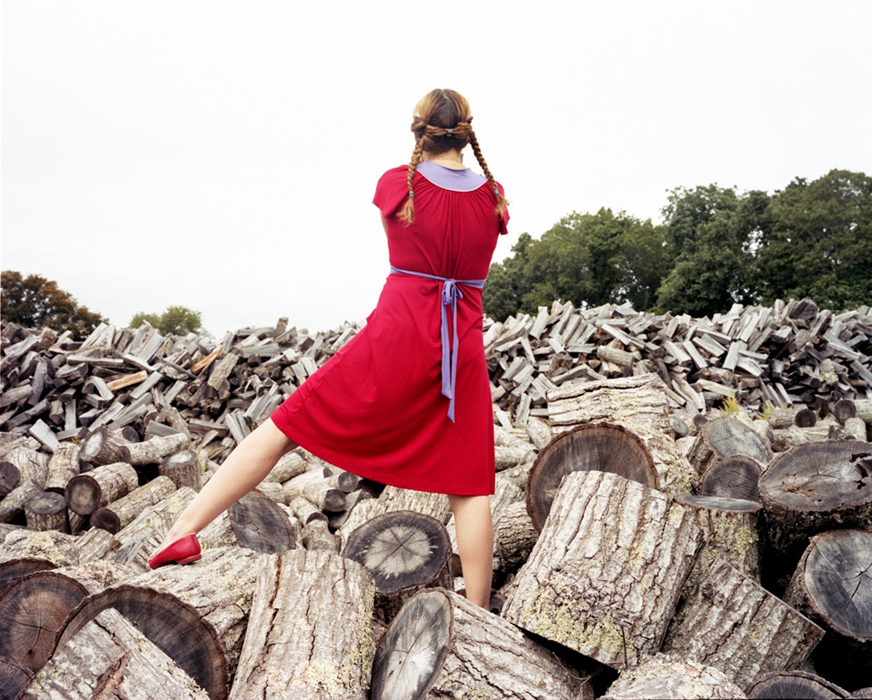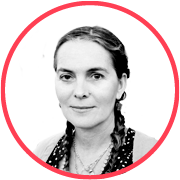
Home Stills: Women in Bastienne Schmidt’s Project

I was traveling for quite a few years for my documentary book projects “Vivir la Muerte” and “American Dreams”. During these trips I started to take pictures of myself in hotel rooms and in places that were not my own. I photographed with a Rolleiflex on a tripod and a self timer and often photographed myself from the back. Once I had kids I became more interested in an investigation of my old and new identities as an artist and mother.
The home was and is often the perfect stage for domestic bliss and self-observation. I challenge this domestic utopia in my conceptual series Home Stills in which I photograph myself as a stand-in in the role of a “Housewife”. The shift of identity as a woman after having children is a tremendous one and opens possibilities to look at the world anew.
I stage with my photographs a visual interpretation of Virginia Woolf’s idea of “a room of one’s own.” In the history of art often the male gaze directed the female model into a specific pose. In the case of “Home Stills” I become one entity: the artist and the model at the same time.
I have photographed in cheap motel rooms and in upscale Hampton’s mansions, and recreated them as imaginary rooms of my own. The sense of quiet meditation in the photographs is reminiscent of Jan Vermeer’s painted interiors and the melancholy atmosphere of Edward Hopper’s art. I take inspiration from wood cut prints by the Japanese artists, Hokusai and Hiroshige in terms of a clear composition and a language saturated with color.
{
“img”: “/wp-content/uploads/2014/08/home_02.jpg”,
“alt”: “Home Stills 1”
},
{
“img”: “/wp-content/uploads/2014/08/home_01.jpg”,
“alt”: “Home Stills 2”
},
{
“img”: “/wp-content/uploads/2014/08/home_03.jpg”,
“alt”: “Home Stills 3”
},
{
“img”: “/wp-content/uploads/2014/08/home_04.jpg”,
“alt”: “Home Stills 4”
},
{
“img”: “/wp-content/uploads/2014/08/home_05.jpg”,
“alt”: “Home Stills 5”
},
{
“img”: “/wp-content/uploads/2014/08/home_06.jpg”,
“alt”: “Home Stills 6”
},
{
“img”: “/wp-content/uploads/2014/08/home_07.jpg”,
“alt”: “Home Stills 7”
},
{
“img”: “/wp-content/uploads/2014/08/home_08.jpg”,
“alt”: “Home Stills 8”
},
{
“img”: “/wp-content/uploads/2014/08/home_09.jpg”,
“alt”: “Home Stills 7”
}
In the first part of the book “Home Stills” there is a sense of observation through the medium of self portraiture, the second part is a cultural observation of women’s roles in movies refracted through doilies and fabrics. I rephotograph women in movie stills through paper and fabric, underlining the mutedness of their secondary presence on the movie screen.
In the past fifty years women’s roles in society have changed tremendously for the better. We still have a far way to go. In many societies women are still denied basic human rights such as education, freedom of choice in many areas of their life. In Western society the overall picture looks better, but women still get paid less than men and the percentage of women in leading professional positions is lagging behind.
I grew up in Greece and have lived in Italy, in Germany and in the US for many years. My experience of having lived in many places resulted in my artistic interest in the concepts of of identity and place. When I think of a scenario that I photograph, the concept comes first, then I go back to a specific location to visually create it. The wandering around, the pause, the reflectiveness, these are important elements for me in the depiction of the shift of identities, especially for women. The visual worlds that I create are imaginary, but based in real life.
{
“img”: “/wp-content/uploads/2014/08/home_11.jpg”,
“alt”: “Home Stills 8”
},
{
“img”: “/wp-content/uploads/2014/08/home_10.jpg”,
“alt”: “Home Stills 9”
},
{
“img”: “/wp-content/uploads/2014/08/home_12.jpg”,
“alt”: “Home Stills 10”
},
{
“img”: “/wp-content/uploads/2014/08/home_13.jpg”,
“alt”: “Home Stills 11”
},
{
“img”: “/wp-content/uploads/2014/08/home_14.jpg”,
“alt”: “Home Stills 12”
},
{
“img”: “/wp-content/uploads/2014/08/home_15.jpg”,
“alt”: “Home Stills 13”
},
{
“img”: “/wp-content/uploads/2014/08/home_17.jpg”,
“alt”: “Home Stills 14”
},
{
“img”: “/wp-content/uploads/2014/08/home_18.jpg”,
“alt”: “Home Stills 15”
},
{
“img”: “/wp-content/uploads/2014/08/home_19.jpg”,
“alt”: “Home Stills 16”
},
{
“img”: “/wp-content/uploads/2014/08/home_20.jpg”,
“alt”: “Home Stills 17”
}
I have published five monographs of my photographic projects so far. My first one, titled “Vivir la Muerte”, was published nearly twenty years ago. The ability to tell a complex story or a concept in a book, makes the book making process so appealing. It goes beyond, let’s say, an exhibition. I think it leaves a deeper trace.
The typography, the layout and the sequencing of the images are a very personal element in the process of making a book. The publishing business has changed tremendously in the past few years. On one hand it has become more democratic, as self publishing allows everyone to have a voice. On the other hand it also has become harder, as there are so many more books published, that especially a quiet book can be overlooked. I promote my books in different ways, mostly through book signings, art publications, exhibitions and online social media. A book is still one of the best ways for the audience to get an in-depth look into a person’s artistic concept.
New and best




